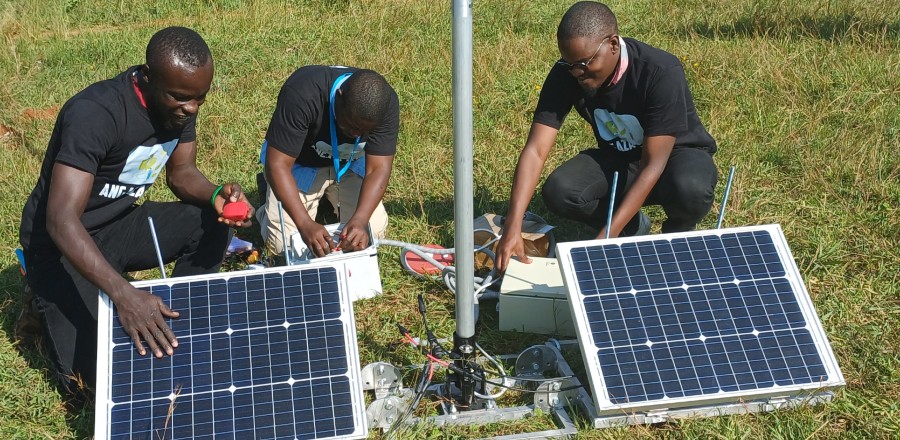Flat-pack turbine takes Kenya test

A flat-pack wind turbine developed by Glasgow Caledonian University students and academics has begun field testing in its bid to bring low-cost power to the Kenyan economy and education.
Researchers involved in the University project, which has been funded by a slice of a £26m Innovate UK Energy Catalyst grant, have returned from Kenya after conducting a successful first run.
The portable wind turbine, invented by Douglas Macartney when he was a pupil at Royal High in Edinburgh, was developed by several teams of undergraduate engineers from Glasgow Caledonian, working over several years to create a viable prototype – including the addition of two solar panels.
The device, which can be assembled without any specialist training, is intended to be used to help areas recovering from natural disasters and in rural settlements far from grid connection.
Dr Andrew Cowell, a senior lecturer at the University and Principal Investigator for the project, said: “The wind turbine was conceived to generate enough electricity to power a light and two USB sockets in a disaster-relief zone or a refugee camp. The addition of solar panels was inspired partly by Douglas’ original idea, and partly from feedback from an Innovate UK research bid partner. All our calculations showed the concept is viable.”
The University has partnered DeCourcy Alexander, a London-based sustainable innovation consultancy, and E-Safiri Charging Limited, a Kenyan SME that focuses on research and innovative solutions to provide access to sustainable energy.
The funding has allowed the three partners to link UK academia and small-scale rural industry in Kenya, where it is hoped the turbine will help create sustainable economic growth and education that will transform lives.
As part of the field exercise, the Glasgow Caledonian team met with the Deputy Vice Chancellor of Maseno University to explore potential areas of collaboration. Dr Liang Wong and Professor Emad Farrag provided guidance and support to the E-Safiri technical team during the setup of the device, where it was then demonstrated and tested.
Following the first field study, Dr Cowell said: “Kenya is the leading country in Sub-Saharan Africa in the exploitation of renewable energy. However, while the majority of the urban population have access to electricity, rural communities in Kenya have extremely low electricity connection rates. Off-grid renewable solutions hold the promise of meeting the energy demands of rural households, including lighting, charging, cooling, and refrigeration.
“Collaboration between various stakeholders will be crucial in advancing renewable energy solutions in Kenya.”
The project is entitled Angaza Africa, Angaza being a Swahili word meaning ‘to give light, illuminate, shine’.
Simon Graham, Head of Innovation at DeCourcy Alexander, said: “Sometimes it seems that the great societal challenges are unsurmountable, but projects like Angaza Africa demonstrate that, by working together for the common good, we can make change happen.”
Carol Ofafa, CEO of E-Safiri, said: “The partnership with Glasgow Caledonian University has seen immense growth in the technical capacity at E-Safiri. We have benefited from a training workshop by GCU when the team visited us in Kisumu, Kenya, that provided practical solutions to renewable energy generation, maintenance of solar panels and battery charging technologies. We look forward to future knowledge dissemination activities that are mutually beneficial to both parties whilst providing access to affordable and accessible energy to the most remote parts in Kenya thus leaving no one behind.”
